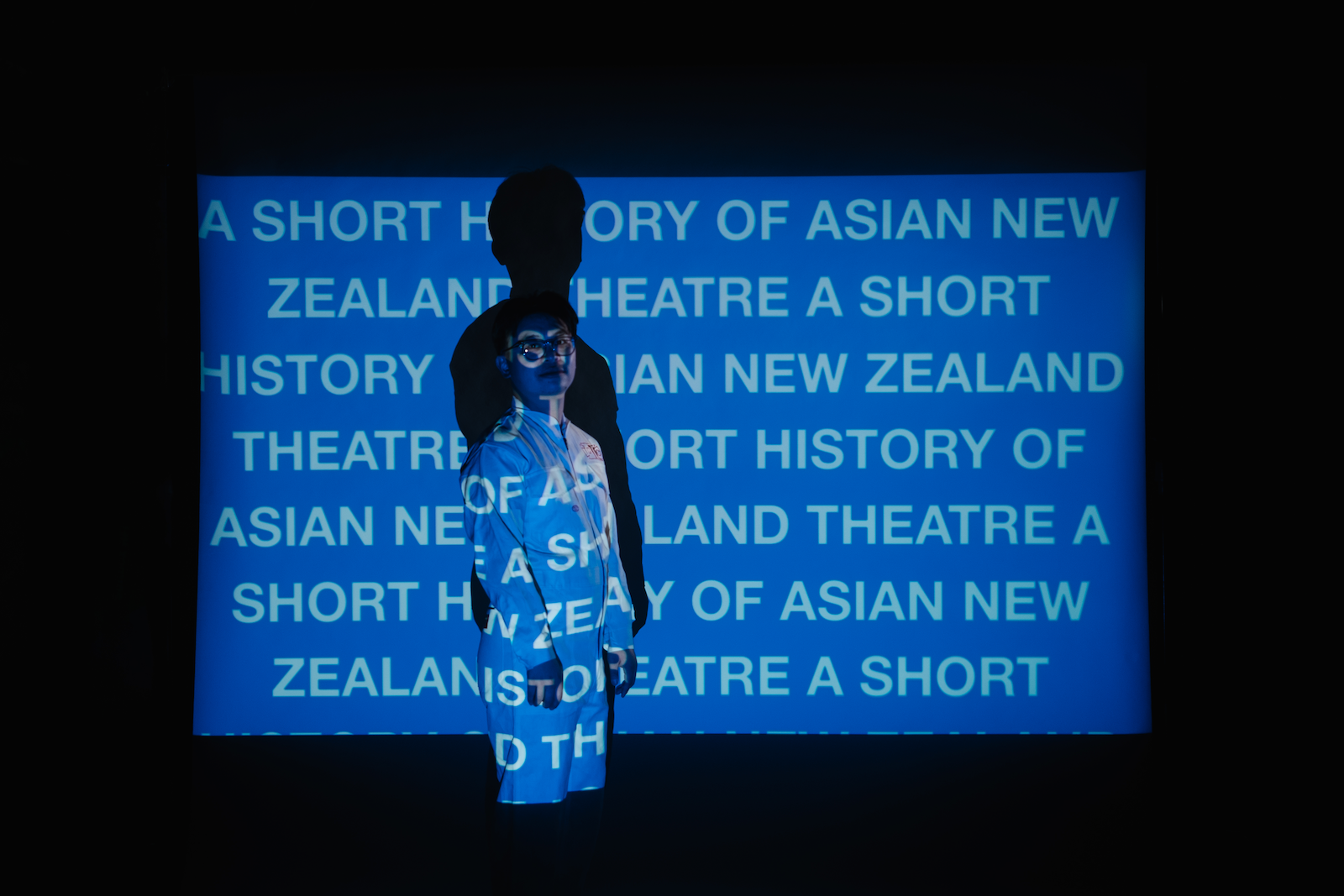I’m a good student and I’ve come to the theatre show nervously prepared with my notebook because how the fuck do you write a response/review to A Short History of Asian New Zealand Theatre!? I tell myself to chill out, no one’s expecting me to write ‘A Short History of Asian New Zealand Arts Writing.’ After all, Satellites, the magazine and archive platform, is already doing it (and how gorgeously they do it!).
I wasn’t sure what to expect from Nathan Joe’s new show. Would it be like the orgasmatron spectacular of Scenes from a Yellow Peril, or the gag-filled family hallmark drama of Losing Face? Maybe something in between, or nothing like anything ever before?
I know him to be a prodding, challenging and generous creative. One of my worst (?best?) memories includes lying on his couch at the Michael King Writers Centre residency at Devonport. Nathan, with the relentless quality needed for a good dramaturg, pushed me to figure out why my main character had no arc, no growth and generally felt confused. Ouch, but necessary. On a larger scale, his theatrical projects often left audiences with an itch scratched in the brain, yet hungry to delve deeper into the web of provocations. It’s a conversation starter and I’ve tended to appreciate the way he leads the audience/horse to water (rather than prescribing a particular response/thirst). Others might find it frustrating—the comfort of being ‘seen’, in seeing your anxieties, worries and woes on the stage. And in the cold night air post-show carpark chats, realising the solutions and soul-searching can only be found back in the hands of the community.
And so, when I saw the Les Mills spin class-style stage set up at the Basement Theatre, I knew I was in for a good ride. Nathan’s looking jolly, excited even, in his ’80s-esque exercise gear. Behind him are two massive screens, reminiscent of a lecture hall. The next 60 minutes making way for lecture slides and creepy uncanny-valley AI videos designed by multimedia artist Darryl Chin.
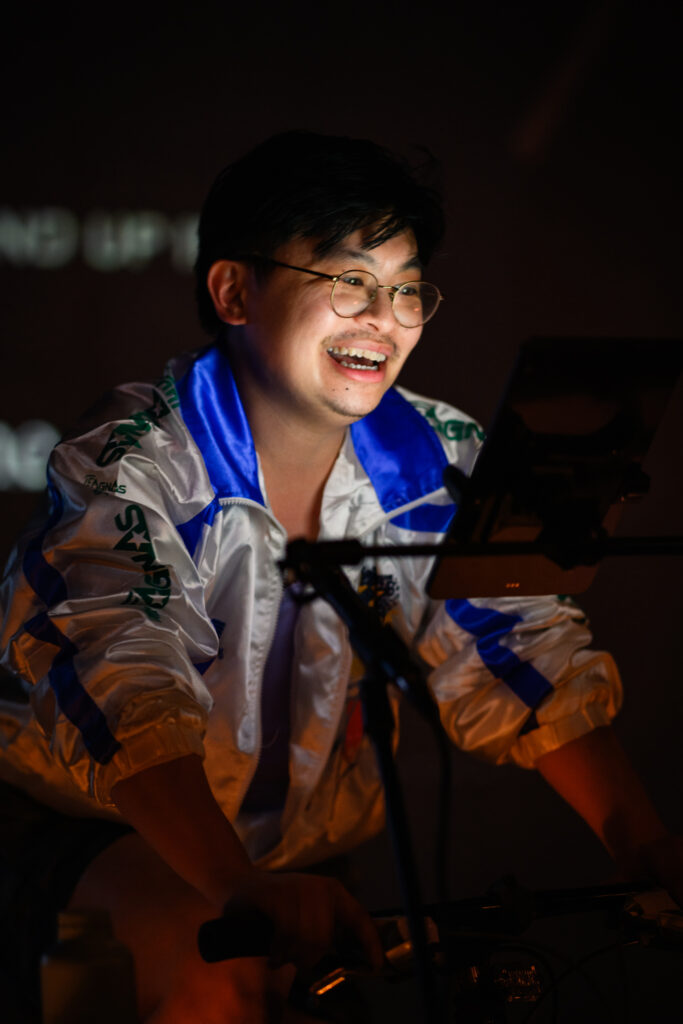
The performer must cycle so the lights stay on. Ha. What a metaphor for the system we survive in. And so as Nathan Joe sweats and lectures, I scribble furiously in the dark. We’re promised a different experience each night. Each new performer will cycle, read through the script, and insert their own take/reflections on Asian theatre when prompted. Playwright Nathan Joe kicks us off. I don’t manage to catch the other nights, but friends assure me each night is just as unique to each performer’s relationship to theatre. Wednesday is Ravi Gurunathan, with acting credits across theatre and screen, including activism and community-spirited The Panthers. Thursday is Jess Hong, international superstar darling from Netflix’s 3 Body Problem. Friday is Kalyani Nagarajan, an actor and writer with a love of comedy, with connections to ATC, Indian ink, and Raised by Refugees. While Amanda Grace Leo closes out the season—a versatile stage and screen actor, powerful singer, and tarot-reader by day.
Exercise 1 starts by inviting the audience to look backward, and interrogate the working framework and definition. What is Asian? What is theatre? What is Asian Theatre? And what does it mean to unpack the collective memory of our existence when, for a certain period of time, has only been viewed through Pākehā lens? Nathan shares the first time he had an interaction with theatre, as one of few Asian kids doing drama in Christchurch.
I was cast in my first role as Shakespeare wizard at 14 years old because I won the debating championships, so had a loud booming assertiveness to my voice. I went so far as taking NCEA Level One Drama, before being forced to drop it by my parents. Unfortunately the Asian Five, ‘calculus, statistics, and three sciences’, still held a grip on my Chinese migrant parents’ conceptualisation of what’s possible. I share this knowing it’s problematic to perpetuate flat stereotypes of tiger parents, but I also did have conservative and traditional parents, so… yeah. I also have Asian friends whose parents encouraged them to just go for what they enjoyed. It’s complicated.
In a glimmer of hope—I remember a poster for The Mooncake and the Kūmara by Mei-Lin Te Puea Hansen plastered on the doors to our school’s black box theatre. I was too shy to ask anyone about it and no one brought it up either. I’ve never seen the show, and maybe never will, but it was enough to see faces like mine, names like mine, a sign of existence, plastered within these spaces that didn’t feel very possible.
This brings us to Exercise 2—tracing the genealogy of some of the first Asian theatre shows and performers. In 2022, Nahyeon Lee’s firecracker The First Prime-Time Asian Sitcom critiques the whole notion and obsession of being the first [insert] [insert] something of something. Woe to the day when we don’t have to carry the burden of being the first or only something of something. But it’s messy, juxtaposing and still undeniably powerful to see names like Jacob Rajan, founder of Indian Ink, flashing on screen as the first Indian graduate of Toi Whakaari.
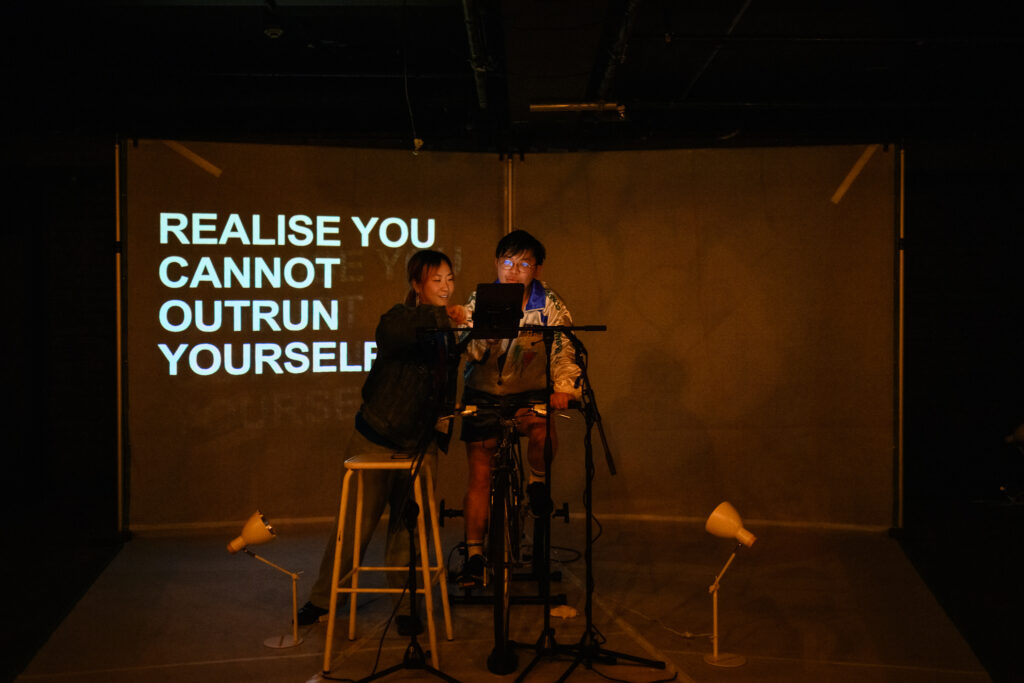
His show Mrs Krishnan’s Party was the first Asian theatre show I ever watched and Kalyani Nagarajan was also the first Asian New Zealand actor I ever saw on stage. Ka-Shue, Lynda Chanwai-Earle’s play, is the first mainstage play in Aotearoa to reflect the Chinese New Zealand experience. While I’m yet to watch the play, my poetry lecturer lent me her copy of Lynda Chanwai-Earle’s poetry in my early years at university. Again, it meant so much to see someone tracing the pathways you’ve otherwise been too scared to let yourself dream about.
Exercise 3, suitably titled “They Fuck You Up, Your Parents”, hits me where it’s tender, lol. The audience lights come on, and Nathan makes us do an exercise together, like some big group therapy session. The question is posed “What is it that you owe?” My friends next to me have a giggle before settling to type away their answers on their phones. Again, without flattening the cultural context, because this isn’t some corporate D&I survey and I don’t know what anyone else wrote down, I scrawl in my notebook something around guilt, shame, filial piety. I try and turn it into something positive like—living my life fully with the freedoms they wished they had, but I don’t know how much I fulfill the migrant dream fantasy ‘cause I’m still a dyke.
A list follows of works including Ka-Shue, Renee Liang’s Lantern, Chye-Ling Huang’s Orientation, Marianne Infante’s Pinay and my friend next to me slaps me across my back and I nearly choke as Sherry Zhang and Nuanzhi Zheng’s Yang/Young/杨 pops up. It’s eye-watering and a bit surreal to see your co-written play up there. Alongside other names who I see as pivotal to my own understanding of Asianess and Theatreness. A week after the show, I meet the new intern at my day job, who told me they watched Yang/Young/杨 at high school, and it was the first time they saw a story like theirs on stage. My breath is knocked out of me again.
“It’s eye-watering and a bit surreal to see your co-written play up there. Alongside other names who I see as pivotal to my own understanding of Asianess and Theatreness.”
When you can connect with those before you and see the seeds of the next generation germinate, it becomes less lonely and frightening. Liberation, resistance and the fight to shift the power structures that oppress us feel all the more possible.
Exercise 4 is titled, “Against Forgetting”. We take a trip through seminal texts that urge our collective memory to remember when the history books have so intentionally worked to erase us. There is Ahi Karunaharan’s semi-autobiographical exploration of community seeking to rebuild and move on after a disaster in The Mourning After, and Talia Pua’s Pork and Poll Taxes on Chinese families in Aotearoa in the 1890s. Spin instructor Nathan poses the ironic question of using theatre as a form to remember and archive when theatre can be so easily forgotten. The experience wholly unique to the audience who show up on those fleeting nights. The show is packed down and those memories carried only by those witness to the ritual.
Even the act of trying to remember, to note down key facts, key takeaways, and be super accurate, from this specific show stresses me the fuck out. I don’t know how professional theatre critics do it! The things I remember directly after the show, to a few weeks later after letting the provocations marinate, already hold a different flavour palate. Is this bad? Is this good? I have a newfound respect for theatre writers, who analyse vibes, moments, and trust that their memory of the night will serve them well. Perhaps it’s a sign I need to trust that my recollection of things will remain and otherwise be okay with its frailty?
The big word flashes across the screen in Exercise 5—Community. A surge of pride, connection and coming together swells in the grassroots organisations that have paved the pathways for generations of Asian theatre to be possible. The groups who aren’t afraid to serve, to prod against and collaborate to establish partnerships. To ensure opportunities flow to the community. Prayas, Oryza, Agaram, Proudly Asian Theatre, Oriental Maidens, Hand Pulled Collective, Yugto, Punctum—all building a tapestry of Asian solidarity.
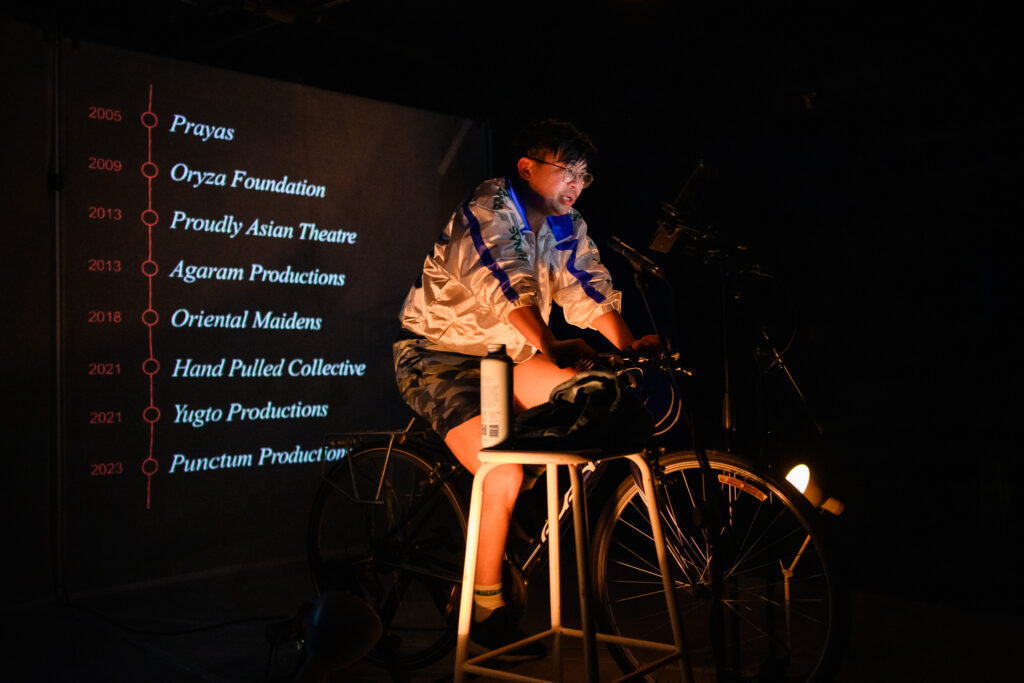
And honestly, like I often find myself in spin classes, my brain detaches and I can only feel the rhythms, sights and sounds. I am worried for Nathan, he has cycled so hard and so intensely. He’s chosen to take us on an uphill battle, yet he doesn’t seem ready to lessen the push.
“The work asks for us to be present, to experience, to breathe, sweat and spin together.”
I’m embarrassed and frustrated at myself. My handwriting is stupidly illegible for the next four exercises. There are random phrases underlined and exclamation marks. I’m writing three sentences stacked on top of each other. I’ve written ‘Charli XCX boiler room set’ at the top of a page and I can’t remember why and at a certain point, I’ve made myself stop scribbling. Because the work asks for us to be present, to experience, to breathe, sweat and spin together. Plus, my cramped handwriting is increasingly illegible and horrifying.
Talking about our resentment, our difficulty, our confusion, our hate, our love, our complaints of the industry is hard. I’ve declared ‘Fuck theatre! I’m never going back to it!’ burn-out, pissed off and run-down. There’s some personal essay floating out in the world about how disenfranchised I feel about the lack of financial sustainability and opportunities from being in the space. Yet I also want to take it back, because since taking a breather from the space, I also miss it dearly. And I’m so grateful for the opportunities, the ladders, the love, that exists despite it all.
Am I an ungrateful baby? I’m melodramatic, I’ve said the same thing about being an ‘arts worker’, ‘journalist’, or ‘creative writer’, and I’ve always found my way back. I’m such a lucky girl to have been welcomed in, to have stayed, and the doors to the whare still remain open when I return. How could I leave one of the first few places that showed me the power of community, learning and grace?
Nathan says something along the lines of, “The problem is forgetting how hard it is, then being disappointed that it’s still just as hard when you return,” and I feel called out. The problem is also illustrated by the lack of support for mentors in leadership positions, the lack of scaffolding in place for emerging artists to move to established, to leadership and to international standing. The research project Enter the Multiverse articulates this in greater detail.
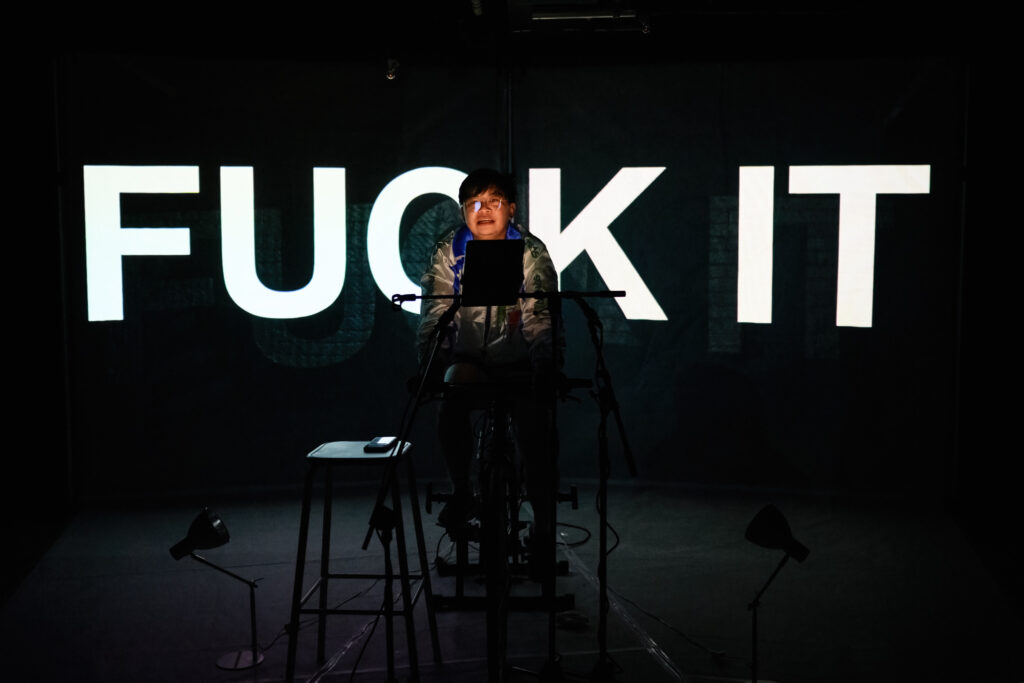
So what does dreaming beyond the system look like? Because when you realise something is broken, you can’t confuse representation for liberation. Again—these phrases shock something into my chest. When you complain about it, then continue to perpetuate the very things you feel shackled by, what then? I’ve felt betrayed and blindsided by the sector, especially when a scarcity mindset (which honestly might be an intergenerational trauma, migrant surviving famine and cultural revolution thing . . . sorry I’ll try to shift that) grips my DNA and causes me to act out. It makes me the worst version of myself—when funding doesn’t get approved, when I get jealous, competitive, comparative, envious, individualistic, scared!
I’m really working on being more gentle and generous, to keep asking for help while also seeing where I can contribute. To be grateful while advocating for more structural support for my friends/colleagues/communities. To feel confident in my pathway as a creative, without relying on the external validation of a grant, scholarship, contract. To lean into community when times are hard, rather than hiding away. All of this and nothing and I don’t know.
During the show, I make a note to re-read Nisha Madhan’s article on Satellites, to mull over her wisdom.
‘Care’ is becoming one of these words about to die the death of the sector buzzword — we’ll see it among the ruins, alongside ‘intersectionality’, ‘innovation’ and ‘performative’. But I’d like to campaign to keep this word alive and do the hard work to actually understand what it means.
Exercise 10—How to Make Asian Theatre.
I think the most impactful thing about Nathan’s show, was the conversations that occurred after. I’m in a circle with friends from the music community saying they wished their sector was even just beginning to be at this stage of the conversation. On another night, a theatre friend notes the shared hopelessness and frustration, of how since using her Asian name on her CV, she has noticed fewer interviews. I have brunch with a filmmaker friend later that weekend, who challenges me because they refuse to let their life run on grant deadlines. Who just keeps making stuff regardless if they get permission. Who believes in crowd-sourcing and self-funding projects when they can. Who sees that as the purpose of their full-time corporate day job.
I think to myself, I’d like to return to theatre. Of course, I would. I needed to be a brat, have a little rant, go through a growth process, get over myself, see these challenges as not unique to myself. The Asian theatre community continues to be one of the warmest community spaces and the most radical and brave spaces I’ve experienced.
“The purpose of a system is what it does.”
Flashes across the screens.
And I’ll spend the rest of my life dissecting that phrase.
In-text photos by Jinki Cambronero, supplied.

